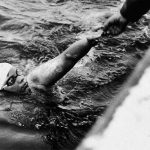Samsung Cross Bosphorus Swim adopts plastics reduction methodology
Image (c) SwimTrek
The Turkish Olympic Committee, which organises the iconic Samsung Cross Bosphorus Swim, has announced its participation in a programme to reduce the plastic waste produced at the event.
Now in its 30th year, the Cross Bosphorus Swim had just 68 swimmers for its first edition in 1989. It now attracts thousands from around the world and potential participants need to win a place through a lottery or go through a recognised event partner such as SwimTrek. The Bosphorus runs through the heart of Istanbul and separates Europe from Asia and so offers a unique opportunity for regular swimmers to swim between continents. Because the Bosphorus is such a busy and important shipping lane, crossing it is only possible as part of an organised event when boat traffic is suspended for a short period of time.
The plastic reduction programme is an initiative by the Ocean Recovery Alliance, which has developed the Plastic Disclosure Project (PDP). PDP is a programme for companies and institutions to measure their baseline use of plastic, how much they recover or recycle, or how much recycled content they use.
Doug Woodring, founder of the Ocean Recover Alliance and a keen swimmer himself says: “Swimming and sports are a great conduit for creating broader public awareness and understanding about the importance and value of waste reduction, recycling, and waste-prevention management.”
The Cross Bosphorus Swim is the first event in Turkey to adopt the PDP methodology.
The Ocean Recovery Alliance works globally on plastic pollution reduction and creating solutions for companies, communities and events to reduce their plastic footprint. PDP Sport provides guidelines to assist event organizers in planning for waste reduction and recycling programmes and a scorecard to help evaluate progress towards certification as a PDP Sport event.
“Plastic is a useful and valuable resource, especially to sports event organizers,” Woodring acknowledges. “However, plastic needs to be managed properly, and doing so can be an easy, but significant, step towards a more sustainable event. Plastic is often highly visible to event participants and those that use the location afterwards, so brands and events want to be careful about the image they leave behind, and also demonstrate that they are responsible and effective event organisers and supporters. In addition, plastic is a valuable commodity, and there are often strong economic reasons for ensuring it is not wasted. Plastic pollution can take hundreds of years to fully degrade, and in the meantime can cause ecosystem and health impacts.”
Woodring is also an event organiser as well as a campaigner for plastic reduction, so he is well aware of the challenges faced. Earlier in July he hosted the 14th Annual Sheko Challenge along a beautiful stretch of Hong Kong coastline. The Sheko Challenge was the first sports event in Hong Kong to not allow plastic bottles or food utensils to be used in order to reduce its waste footprint.
The Cross Bosphorus Swim takes place in July each year. To secure a place for 2019 you need to enter the ballot organised by the Turkish Olympic Committee (see here for details). Alternatively, the swimming holiday operator SwimTrek have secured a number of places in advance and offer package trips to Istanbul that include accommodation and local transport to the event. Find out more here.
For more about the Ocean Recovery Alliance see here.







